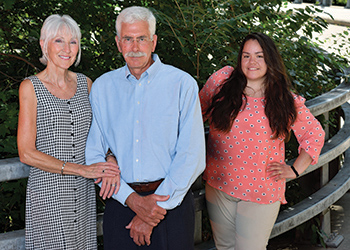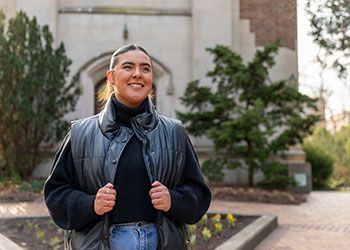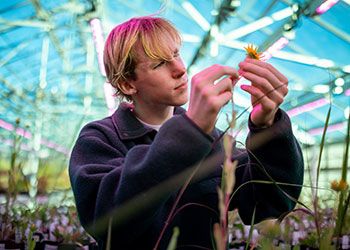The Heart of a Scholarship
The value of a scholarship often goes well beyond its dollar sign
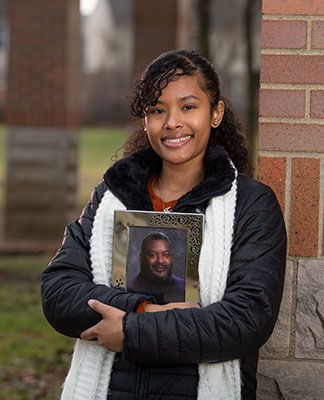
The Heart of a Scholarship
The value of a scholarship often goes well beyond its dollar sign
February 19, 2021College is a lot.
A lot of change. A lot of pressure. And a lot of financial stress.
When students look back on their college experience, sure, they remember the highlights: their most formative classes, their dearest friends, going to sporting events, trekking across campus in a blizzard and studying outside during finals week in the spring.
But they also, unfailingly, remember the people who stepped in when the change, the pressure or the money got to be too much.
For so many students, those people are kind and caring MSU faculty and staff members, and the safety net is the inestimable gift of a donor-funded scholarship.
While the financial impact of a scholarship is often its most tangible effect, there is also something to be said for its impact on a student’s sense of self-worth and readiness to step out into the world on their own two feet and begin having the same impact on others.
A peek into the lives of two young women, both scholarship recipients making the most of their time at MSU, explains it best.
Help arrived at a make-or-break moment
Jessica Wright had not looked at an MSU assignment in weeks. Most of the time, she couldn’t eat, sleep or even get out of bed, let alone concentrate on a lecture or lab.
Like most students, her life was upended when the coronavirus pandemic forced a universitywide shutdown last March. Yet Jessica could have dealt with a switch to virtual learning and a move back home, even the loss of her residence hall job and the sudden social isolation.
What knocked her down was heartbreak when COVID-19 took her father in the second week.
“I was so close to quitting,” says Jessica, who up until that point had been a thriving junior in the College of Natural Science (CNS). She was a Charles Drew Science Scholar, an active member of the MSU Dental Club and an Asian-Pilipino student society, and a volunteer Big Sister. She dreamed about becoming an orthodontist because she understood how much teeth can be a source of pain and self-doubt, especially in low-income populations, and she wanted to help. “I was so close to giving up on what I had been working so hard towards.”
She knew she was falling behind, and the stress from that only made it harder for her to try and pick up the pieces of her academic life. One day in late April, she worked up the energy to just check her MSU email. A message from Carolyn Sekedat, a member of the CNS Dean's Office staff, immediately caught her eye. “Conner Scholarship Offer” was the subject line. And Carolyn’s message said the deadline to accept was in two days.
Jessica took it as a wake-up call.
That somebody out there saw my potential and decided to help me continue my journey through education, that had to mean something. I couldn’t just quit after knowing that somebody was graciously giving me something they had worked hard to earn.
For Carolyn, who helps to administer about 40 scholarship funds for the college, sending those emails to students is one of the most gratifying parts of her job. “It’s not my money,” she says, “but I get to facilitate it and, with stories like Jessica’s, I am grateful that these funds exist because the support means so much to the students.”
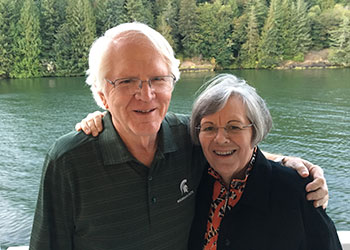
The donors, Bill and Mary Conner, earned Ph.D.s from MSU in 1970. They recall how their graduate assistantships were enough to cover all their expenses, from rent to food to textbooks. At the time, a Spartan Village apartment cost just $90 a month, including utilities, and they were able to leave MSU debt-free. Over the years, they’ve kept an eye on the cost of a college education, and they created their scholarship to help today’s students financially. More than that, though, trips back to campus have allowed them to meet other recipients like Jessica and to hear firsthand about the true impact a scholarship had on their lives.
"We found Jessica's story so moving when we first heard it last fall and were pleased to know that our scholarship would help her achieve her goals. She's a most deserving recipient!" say the Conners.
Today, Jessica is in her senior year at MSU, living with her mom in Westland. She recently landed a part-time job as a pharmacy technician—something she’ll add to her portfolio for dental school. She knows she’s on a path her father, a patient and charismatic paraprofessional who dedicated his life to students with special needs in Westland schools, definitely not only approved of but related to.
“Like my Dad, I want to help people feel better about themselves,” she says.

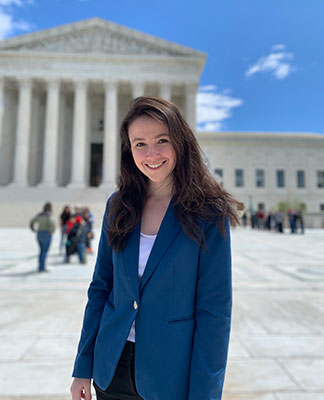
A confidence boost that keeps on boosting
When you ask a young person what interests them, there are the predictable answers (Art! Animals! Sports! Computers!), and then there’s Maysa Sitar’s answer.
Maysa is a senior at MSU, a leader in student government and a Mitchell Scholar headed to study in Ireland after graduation. She is also a STARR Scholar from the small town of Newberry in Michigan’s Upper Peninsula.
And she’s interested in…voting.
It started at a very young age, when her civically engaged parents would take her to the polls because she was too small to stay home by herself.
“I loved it—the polls were fun,” she says of watching her mom do her civic duty. “And I was really surprised when so few of my friends were interested in voting once we were old enough. I ended up registering some of them and taking them to the polls with me.”
To Maysa, voting symbolized something important: an opportunity for people—even those from a secluded rural area like her hometown—to have a say in something much bigger than themselves.
The idea of being involved in something bigger than oneself followed Maysa to MSU, where she found her niche, getting involved in organizations, initiatives and research projects that brought her even closer to the topics that interested her: voting behavior, electoral policies and the legislative process.
She served on the Associated Students of MSU as the vice president of governmental affairs.
She joined the Secretary of State’s Collegiate Student Advisory Task Force, a group created in 2019 by Michigan Secretary of State Jocelyn Benson to address issues surrounding college-aged voters. The team of 33 students from 20 colleges around the state collaborated on a set of recommendations on how to increase collegiate voter turnout.
I never, in my life, thought I would win a national scholarship like the Mitchell. Ever. Ever. And I think it’s definitely very heavily influenced by being awarded the STARR, and everything that has unfolded since.
This past summer, Maysa interned remotely with Congresswoman Elissa Slotkin, and got a taste of politics in the lead-up to the 2020 elections.
And as election season rolled around, she became a deputized clerk for Ingham County, registered her fellow students to vote and helped count absentee ballots.
All of this was bolstered by her STARR scholarship, which gave her the financial freedom to fill her schedule with activities and opportunities that interested her, without having to worry about whether they paid.
But it also gave her something else: a sense of confidence, in herself and in her choices.
“Simply being chosen for the STARR scholarship made me more confident in my own abilities,” Maysa says. “When you find an opportunity that interests you, sometimes you have to put yourself out there, and you have to ask for it, and I don’t know if I would’ve felt as confident doing that if I didn’t have that built-in support network of the STARR behind me.”
Her involvement, her research pursuits and that sense of confidence were enough to earn her a prestigious scholarship for the next chapter of her life, too.
The Mitchell Scholarship is awarded to no more than 12 U.S. students each year, and funds tuition, travel and a living stipend for one year of postgraduate study in Ireland. There, Maysa plans to broaden her research into elections, learn more about how they work around the world and bring back what she learns to the U.S.
After that? She wants to take both a research- and law-based approach to voting advocacy—one that will help inform voters, fight for their rights and break down the barriers to truly free and fair elections on a national scale
Her 18-year-old self, registering a few friends and dragging them to the polls, would be proud of how much bigger her impact is going to be.
LEARN MORE about scholarship support for students by contacting the Advancement Office in your college or unit, or Senior Director of Development for Scholarships and Fellowships Jennifer Bertram at bertram9@msu.edu or by calling (517) 432-7330.
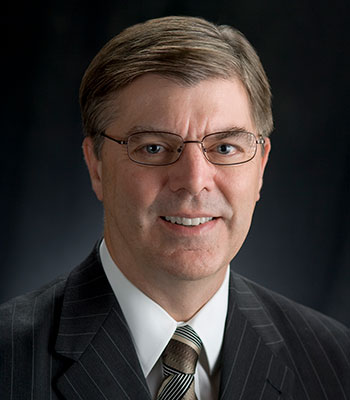
Empowered Staff
Every scholarship makes a difference, and every MSU staff member or administrator who is involved in awarding one gets to carry around the feeling that they have changed a young person’s life for the better.
Doug Estry, associate provost for Undergraduate Education and dean of Undergraduate Studies emeritus, carries that around a hundredfold.
For more than a decade, he has helped direct the STARR Scholarship program, serving on the selection committee and helping to welcome each new STARR scholar to MSU. He also acts as a mentor and a guide throughout their time on campus, and he cannot say enough about their capacity—as a group—to make an impact. They’ve certainly made one on him.
“From the first day we meet them on campus to the day they graduate, engaging with them, facilitating their success, helping them through challenges, being there when they need support, helping them appreciate that life is about growing their independence while understanding that real success is also about interdependence—it’s an amazing feeling,” he says.
The STARR scholars come from different family backgrounds, ethnicities, sexual identities and may take widely different courses, but when they come together their connection and support for one another is instantaneous, Estry notes. “It’s like a homecoming,” he says. “They share a common bond: they have been given an amazing gift by amazing donors and they deeply recognize it.
“Over the last 12 years, I have come to know the STARR donors, who wish to remain anonymous. It has been one of my deepest honors to be able to help facilitate their vision for giving students—who might not otherwise have had the opportunity—a chance to study at an institution like MSU. Their generosity has fully funded over 200 students, and people need to know how one couple’s generosity over 23 years has not only touched the lives of 200 students, but the lives of thousands of people that those students have touched as well.”
After MSU, STARR scholars have gone on to become doctors, nurses, engineers, authors, teachers and politicians. They have pursued advanced degrees, worked on groundbreaking research and started nonprofits; and have worked, lived and impacted the people around them all over the world. But they haven’t forgotten where they came from: the STARR alumni have also started their own endowment to begin giving back in appreciation for what was given to them.
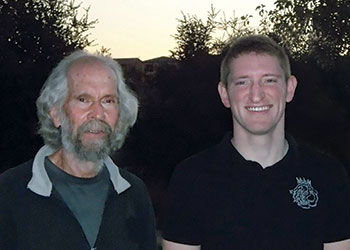
Providing Funds and Encouragement
When a student receives a scholarship award, the money means a lot and so does the message behind the money.
“When you give a scholarship, you’re giving money, but you’re also telling the recipient that you believe in them and want them to succeed,” says Chris Wright, who along with his father, David Wright (’75, Ph.D.), recently established an endowed scholarship at MSU. “And that’s incredibly important.”
The Wright family has a multigenerational history of giving. Part of the war generation, Howard Wright and Doris Spahr (David’s parents) understood self-sacrifice and knew the value of a strong community. They met in a chemistry class in 1941 and married in 1942. Howard worked in a munitions plant during the war and later at Abbott Labs as a synthetic organic chemist. After raising David and his three siblings, Doris went back to school and earned her master’s degree in special education. Doris and Howard also established the Wright Home for severely disabled adults, and often took in kids from troubled homes who needed a stable living environment.
Five years ago, Chris, who earned a degree in communications from Stanford, approached his dad with the idea of starting a scholarship fund for high school students from immigrant families.
Chris, who was adopted from Russia, was inspired by a childhood friend who grew up in a family that did not have as many resources.
“He was able to get some college scholarships, earn his medical degree and become a successful physician,” Chris says. “But what if he hadn’t been able to become a doctor and achieve his dreams?”
David adds: “I really liked the idea of giving to MSU because it’s a land-grant university, it’s for everybody.”
David retired in 2018 after 25 years of work in building NMR instrumentation and 22 years of design and implementation of mass spectrometry data processing techniques. Chris is currently the head of growth for an online reputation management company located in California.
“When I sent in that first amount of money for this MSU scholarship fund, it was so internally rewarding,” says Chris, who now wants to expand his giving. “I’m always asking my dad: What more could we be doing? What else can we be engaging with?”
It’s just the Wright thing to do.


